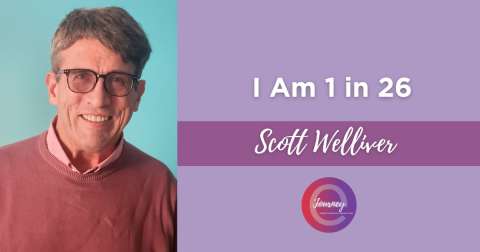I Am 1 in 26

By Scott Welliver , Connecticut
Person with EpilepsyTuesday, November 28, 2023
In 1970, I became one of the 26 individuals who developed epilepsy in their lifetime. At the time, my diagnosis was verbal auditory agnosia, which ultimately became Landau Kleffner Syndrome (LKS). I was eight years old when I showed signs of hearing loss. A visit to a hospital in the Bronx for four days of testing, including an EEG, determined I was having seizures. A child neurologist put me on an anti-seizure medication, but there was no guarantee for my parents that it would work. They considered alternative schools instead of public schools for me.
I, fortunately, reacted well to the medication and began to recover. I never had to leave public school that year or at all. I managed to finish elementary school with the help of an aide but would attend middle school without one. I never needed additional help in school and graduated on time in the spring of 1980 as a B+ student.
In 1977, the neurologist I had seen, and colleagues wrote an article for Developmental Medicine & Child Neurology, where I was a featured case. Around the same time, I was weaned off of my medication. Since about 1979, I have been off of medication and seizure-free. I graduated in 1984 from Muhlenberg College with my BA degree. By 1992, I had also received my MS degree from Iona University. At one point following my schooling, I met with my childhood neurologist, who stated that my recovery from LKS was one of the best she had ever witnessed.
My epilepsy story doesn't end there. In 2006, it was suggested that my daughter repeat kindergarten. Her teacher couldn't explain why but only said she was "mentally absent" sometimes. An EEG confirmed she was having seizures and had benign rolandic epilepsy. As a father, I was terrified, for I knew my outcome with seizures may not be her outcome. Fortunately, my daughter had normal EEGs before she entered middle school and has been seizure-free and medication-free ever since. She is now a senior in college pursuing a degree in marine sciences. I am grateful for the positive outcome for my daughter and I.
For the longest time, I never wanted to share my story or even acknowledge I had epilepsy. It is difficult for me to put into words the challenges I faced. I knew epilepsy was an important part of who I was, but I didn't want people to know it was a part of my history. I had recovered, so it was no big deal. I have since learned that my story is not common.
I want to share my story and how fortunate I am. I was fortunate to have such a well-known and respected child neurologist. She not only understood the science, but she also was a mother. My parents were critical to my success and recovery. They were there for me and encouraged me to achieve beyond what statistics suggested. Lastly, my teachers, especially elementary school teachers, always kept me from performing the status quo. They had faith in me and my abilities and never gave up on me.
I grew up attending a Christian church. My faith has been important to me for most of my life. One of the scriptures I recall being read mostly at weddings speaks of important aspects of life - faith, hope, and love - and names love as the greatest of these three. For anyone who has a life that is impacted by epilepsy, I think these aspects are important to have. Don't give up faith, don't give up hope, and most importantly, don't give up love.
I want others to know that people with epilepsy struggle with it every day. They dream of a day they might never have another seizure or can finish high school, get married, and have children. I want people to know that many people with epilepsy achieve marvelous things. I want people never to abandon hope.
Reviewed By: Sara Wyen
